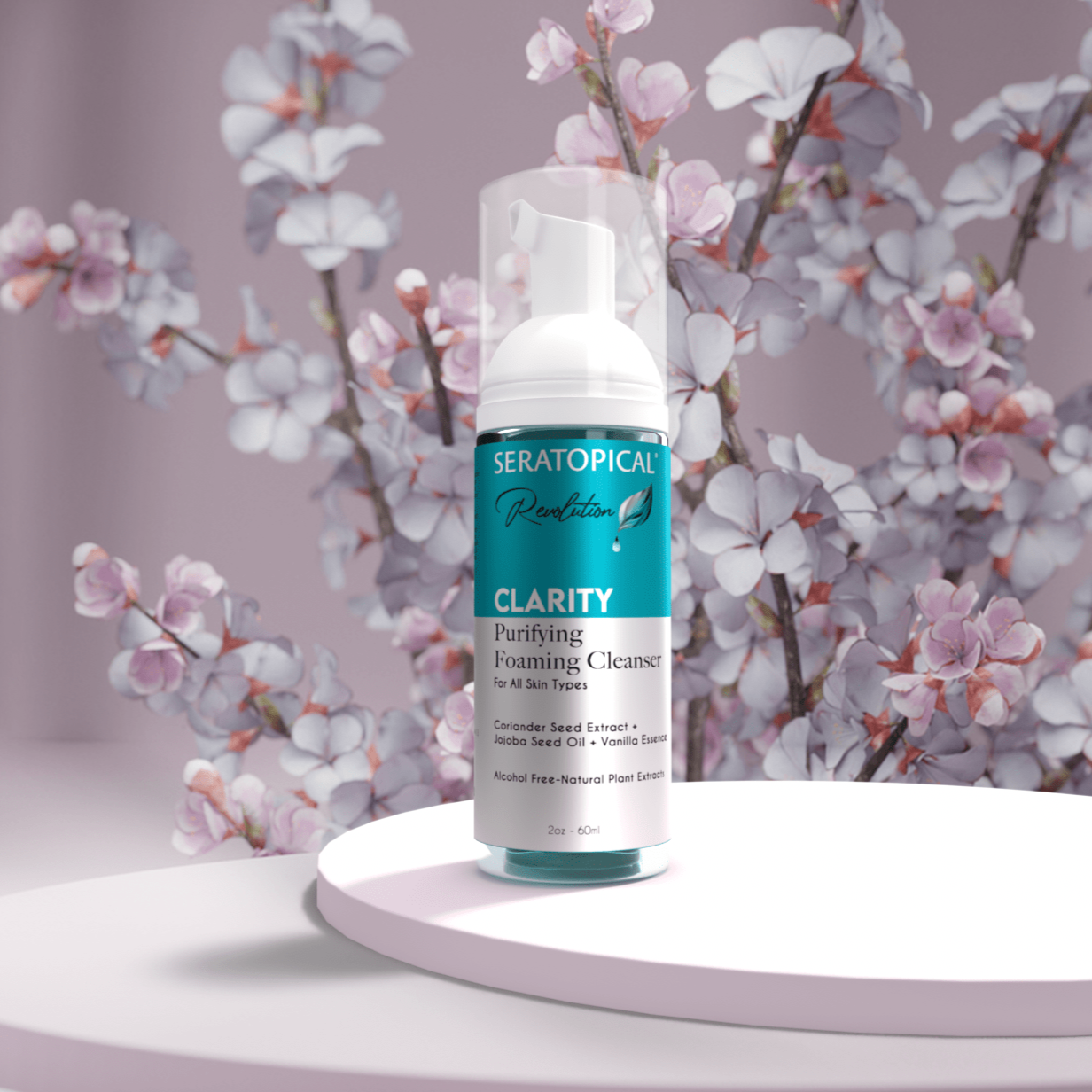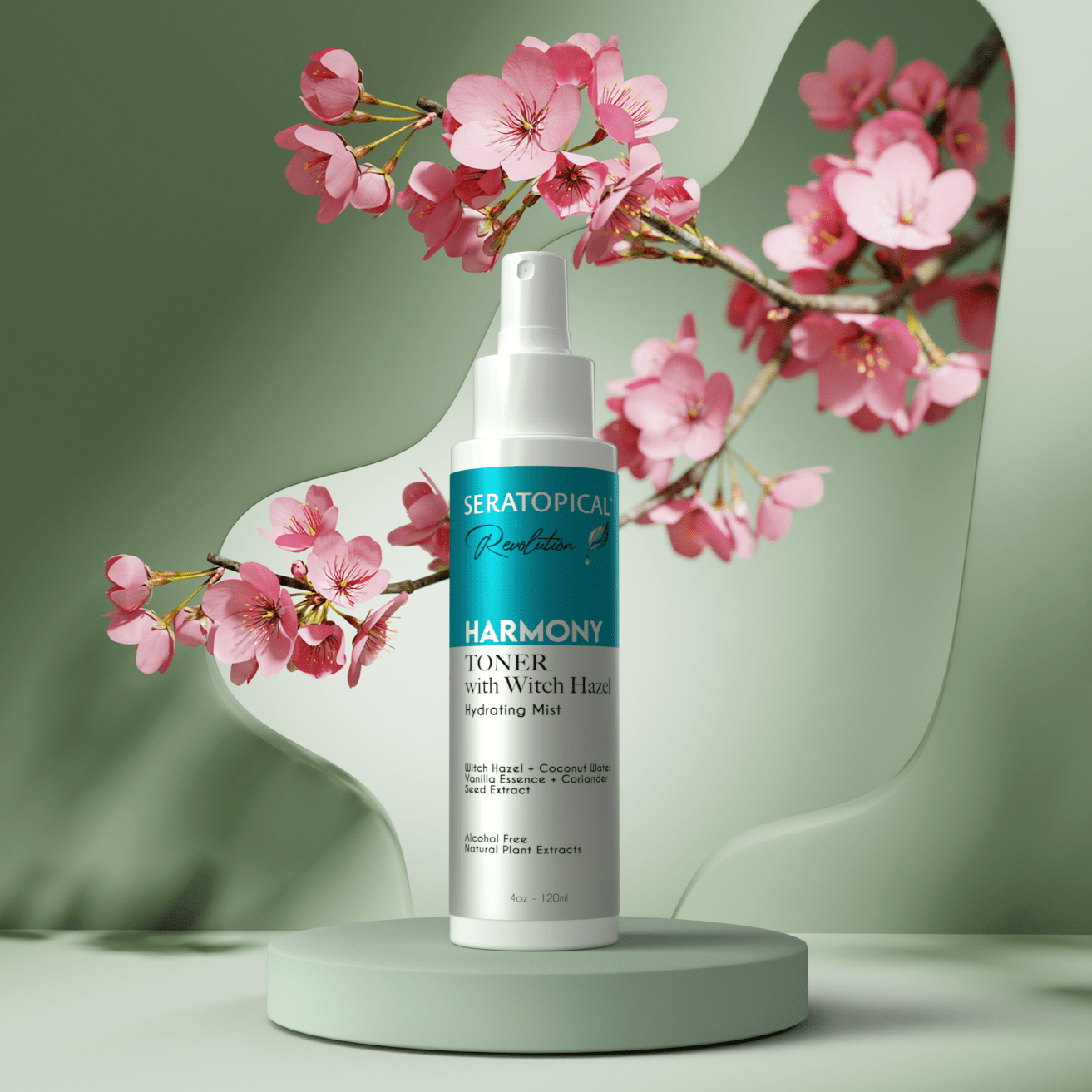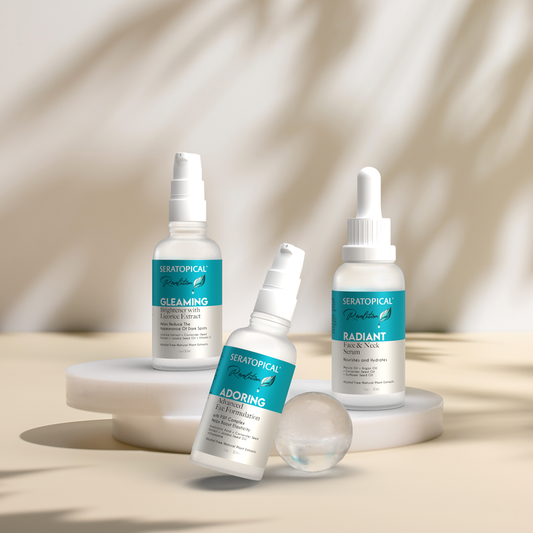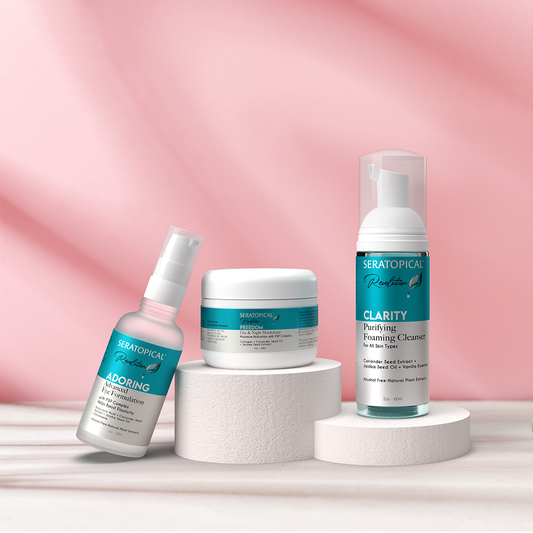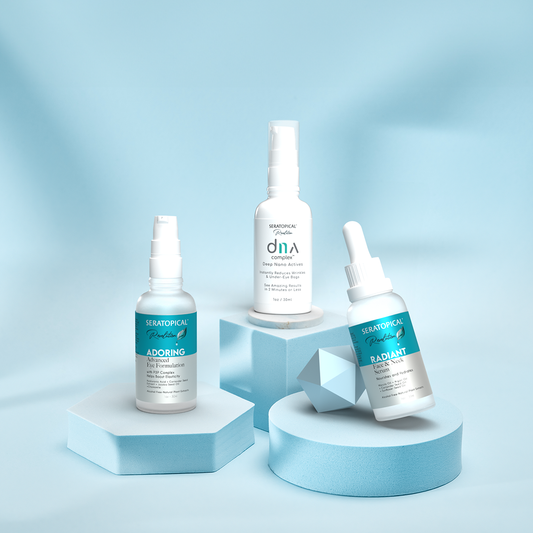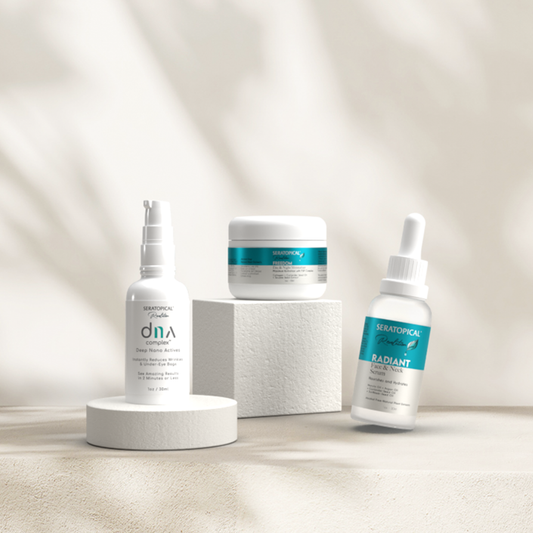When it comes to skin care, there are many tried and tested methods that have shown some proof in making positive, or negative effects. For many years, healthcare professionals have looked into how we can protect and nurture healthy skin. Facial skin is particularly sensitive, and a skincare routine using the correct skin care products should be implemented to ensure best results. One ingredient which is often found in skin care products is alcohol, and alcohol-based products can easily be found on the shelves of many retail outlets. You will be familiar with facial product labels that have alcohol listed on the labels, making use of the words 'isopropyl alcohol', 'denatured alcohol' or 'SD alcohol'.
So, the question is, why do so many dermatologists and healthcare professionals tend to say that you should steer clear of using alcohol for skincare, especially for the care of your facial skin. As you continue to read, we will unpack the various types of alcohol found in skin care products, the purpose of alcohol in skincare as well as alternative methods to skincare, without using alcohol.
The Science Behind Alcohol’s Effect on the Skin
Alcohol can have several detrimental effects on the skin due to its dehydrating and inflammatory properties. When consumed, alcohol acts as a diuretic, leading to increased urine production and dehydration, which in turn reduces the skin’s moisture levels, resulting in dryness and dullness. Additionally, alcohol consumption can impair the liver's ability to detoxify the body, leading to the accumulation of toxins that can manifest as skin issues like acne and redness.
Alcohol also triggers inflammation, which can exacerbate conditions such as rosacea and psoriasis. In skincare products, alcohol is often used as a solvent or preservative, but its high volatility can strip the skin of its natural oils, disrupting the skin barrier and leading to irritation and increased sensitivity. The cons of using alcohol in skincare include potential dryness, irritation, and the exacerbation of skin conditions, making it unsuitable for those with sensitive or already compromised skin. Therefore, both the ingestion and topical application of alcohol can negatively impact skin health, highlighting the importance of alcohol-free alternatives in skincare routines.
Are There “Good” Alcohol’s for the Skin?
While many types of alcohol can be harsh and dry to the skin, certain "good" alcohols, known as fatty alcohols, can be beneficial. Fatty alcohols, such as cetyl alcohol, stearyl alcohol, and cetearyl alcohol, are derived from fats and are used in skincare formulations as emollients and thickeners. These alcohols help to moisturize and soften the skin by creating a protective barrier that prevents moisture loss. Unlike their drying counterparts, fatty alcohols are non-irritating and can improve the texture and consistency of skincare products, making them smoother and easier to apply. Additionally, they help stabilize and enhance the performance of other active ingredients in skincare formulations.
In contrast, alcohols to avoid in skincare include denatured alcohol, ethanol, isopropyl alcohol, and methanol. These types of alcohol, often labeled as SD alcohol or simply "alcohol," can strip the skin of its natural oils, leading to dryness, irritation, and increased sensitivity. Therefore, while not all alcohols are harmful, it's crucial to distinguish between the different types and recognize the beneficial role that fatty alcohols can play in maintaining healthy, hydrated skin.
Types of Alcohol
Understanding the types of alcohol in skincare helps consumers make informed choices that support skin health.
Denatured Alcohol (Alcohol Denat)
At its very basic, this type of alcohol is packed with ingredients that make it poisonous and smell bad. The reason this is done is to prevent human consumption of this type of alcohol. Alcohol denat is highly drying and incorporating it into your skin care regime may remove much of the moisture in your skin. (Ethyl alcohol is a type of denatured alcohol). The reason it has a certain appeal is due to the immediate anti-grease effect it can have, especially for those with oily skin. This does not however mean that denatured alcohol may be good to control oily skin, as it often may have the opposite effect, possibly causing breakouts, due to stripping all moisture, and causing the skin and oil glands to possibly overproduce oil.
Rubbing Alcohol (Isopropyl Alcohol)
Rubbing alcohol is also often referred to as isopropyl alcohol as it is largely made up of isopropyl. As with denatured alcohol, rubbing alcohol does not smell very nice. Many skincare products contain rubbing alcohol as it acts as anti-foaming, a solvent and an astringent. Some use rubbing alcohol to clean wounds. Rubbing alcohol may cause damage to the skin barrier and should not be commonly used in a skin care routine. As well as drying out the skin, rubbing alcohol may make the skin red, tight and even start to flake. Skin irritation may occur, leaving your skin dryer than when you started.
Cetearyl Alcohol
Cetearyl alcohol may be considered one of the “good” alcohols when used in small quantities. This type of alcohol is a fatty alcohol and acts as an emulsifier. This means that cetearyl alcohol (as well as cetyl alcohol and stearyl alcohol), the fatty alcohols, may cause moisture to be locked in, and could act as a barrier for the skin, adding value, rather than irritation. There are also other types of alcohol that we have not covered here, such as ethyl alcohol, SD alcohol and methanol.
Alcohol and Skin Types
It's true that different skin types may be affected differently by different products. Alcohol is no different for various skin types. While it is not super beneficial for any skin type, some take a bigger hit than others when denatured alcohol or rubbing alcohol is used. When reading skincare product labels, the further up on the ingredients label the ingredient is, the more of it, it contains.
Sensitive Skin
This skin type may be particularly prone to reacting adversely to alcohol in a product as alcohol may lead to a disrupted barrier on the skin cells surface. When applying new skincare products to your regime, you should do a patch test on the inner arm, in the crook of your elbow. If you see a reaction, you may want to stay away from the product at all costs to ensure further damage does not take place. A rule of thumb for someone with this skin type is to check the ingredient labels for the very substances that may harm your skin, such as volatile alcohols. Using products that are natural or plant based may probably your best bet - think of soap and water or coconut or olive oil.
Dry Skin
Typically, dry skin is identified as flaky and irritated. Those with this skin type may want to avoid alcohol-based products at all costs, as alcohol does have a naturally drying effect on the skin and does not promote hydration. Moisture is key to those who have this particular skin type. Using products that lock in the moisture is key—think of the fatty alcohols we discussed earlier, and be sure to keep the hydration levels up!
Oily Skin
This type of skin may be prone to undesirable skin conditions and may have a shiny appearance or greasiness to the touch. One false 'rumor' that is often spread is that drying out the skin is best to control oily skin. As alcohol-based products have an immediate de-greasing effect, they're often quite attractive at first glance. The truth is, however, that drying out the skin could make oily skin worse, as it removes all moisture, forcing the skin to produce extra sebum, and then possibly over compensating. The result: dry skin when product is applied, and overly oily skin as the day progresses. A possible solution is to look at products that contain ingredients which will help rid the skin's protective surface of dead skin cells and other pollutants that may block pores.
Combination Skin
Combination skin is typically identified by an oily T-zone and dry cheeks. Using alcohol on combination skin can also have the opposite effect desired, drying out the skin more, and creating an inconsistent appearance.
Long-Term Consequences of Alcohol Use on Skin Health
Long-term use of alcohol can have significant detrimental effects on skin health. Chronic alcohol consumption leads to persistent dehydration, which strips the skin of essential moisture and natural oils, resulting in dryness, flakiness, and an overall dull complexion. Alcohol also dilates blood vessels, which can cause and exacerbate conditions such as rosacea and permanent redness. Additionally, the liver's diminished capacity to detoxify the body effectively due to prolonged alcohol use can lead to a buildup of toxins, manifesting as acne, puffiness, and a loss of skin elasticity. Over time, alcohol-induced nutrient deficiencies, particularly of vitamins A and C, which are vital for collagen production and skin repair, can accelerate the aging process, leading to premature wrinkles and sagging.
Skin-Friendly Alternatives to Alcohol
There is a huge push toward using more natural, plant based and alcohol-free ingredients in our lives - both topically on our bodies, as well as what we eat. Living a more natural life may be more than just a trend, and may in fact have powerful benefits for your overall wellbeing. When looking at skin care products, there are skin-friendly alternatives to alcohol abound! Keeping your skin healthy means staying away from skin damaging products, such as bad alcohols in skincare and protecting your skin's barrier. The active ingredients contained in some natural products aim to penetrate the skin's barrier deeper, and as the product is packed with a high dose, the effectiveness is increased. Some skin friendly alternatives include:
- Tea tree oil
- Chamomile
- Aloe vera
- Glycerol
- Vitamin C
- Shea butter
- Rose hip oil
- Peptides
- The list goes on!
As you can see from the above, there are so many alternatives to using alcohol on your skin, there really is no reason to be using harmful and harsh ingredients, when you can get the same (perhaps better) benefits from natural products.
Plant-Based Skin Care
The alcohol-free line Seratopical Revolution offers a superior skincare option by avoiding these harmful effects. This line focuses on using gentle, nourishing ingredients that support skin health without the drying and irritating consequences of alcohol. Seratopical Revolution products are designed to hydrate, protect, and rejuvenate the skin, promoting a youthful and radiant complexion. By choosing alcohol-free skincare like Seratopical Revolution, individuals can maintain optimal skin health and avoid the long-term damage associated with alcohol-based products.
The Revolution Skincare Suite incorporates high-quality, natural ingredients known for their hydrating, anti-aging, and rejuvenating properties. By focusing on alcohol-free formulations, Seratopical Revolution Suite ensures gentle care that supports the skin's natural barrier, improves texture, and enhances overall complexion. It's an ideal choice for those seeking effective skincare solutions that prioritize skin health and minimize the risk of irritation and dryness.
SOURCES:
-
https://www.everydayhealth.com/smart-skin/alcohol-in-skin-care-is-it-ever-okay/
-
https://www.paulaschoice-eu.com/alcohol-in-skincare-the-facts
-
https://www.healthline.com/health/rubbing-alcohol-acne
-
https://www.paulaschoice.com/expert-advice/skincare-advice/ingredient-spotlight/alcohol-in-skin-care-the-facts.html
-
https://labmuffin.com/how-bad-is-alcohol-in-skincare-really/



